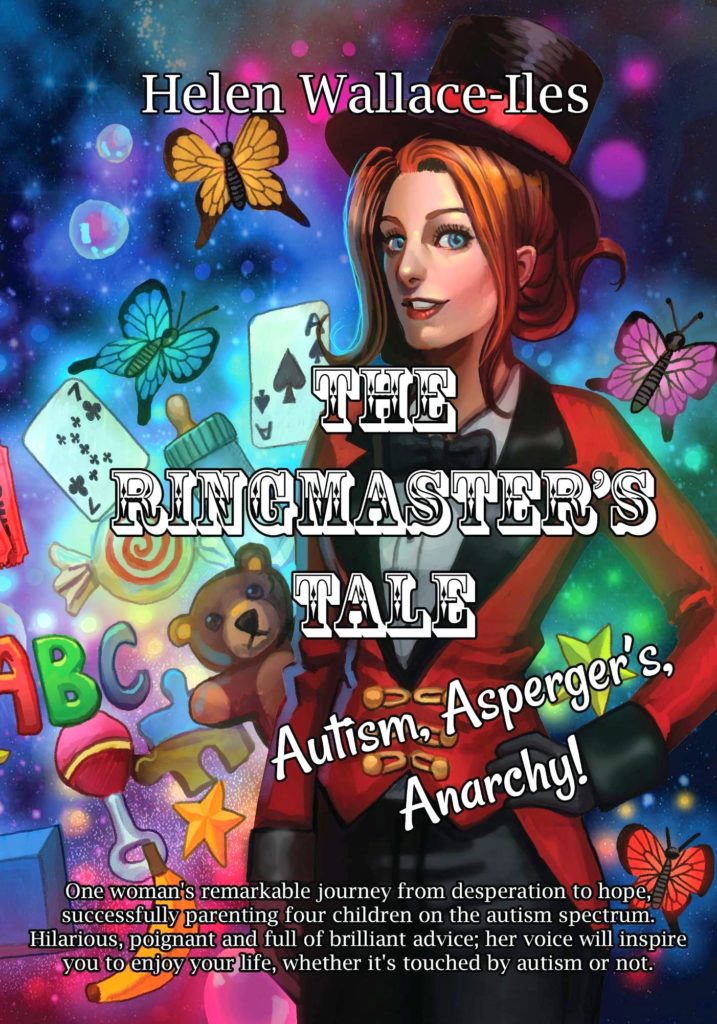Top Ten Myths About Autism
Nothing in life is to be feared, it is only to be understood.
Now is the time to understand more, so that we may fear less.
Marie Curie

This list is an excerpt from the book ‘The Ringmaster’s Tale’ by our CEO and Founder, Helen Wallace-Iles. You can buy a copy by clicking on the image:
1. Having Autism Means You’re Retarded
Believe me, I loathe the word ‘retarded’ as much as most decent people do nowadays, but there’s no guarantee that someone won’t say it to you, so it’s best to be prepared for this kind of comment.
The truth is that people on the autism spectrum tend to have either average or above average intelligence levels, and any diagnosis of an autism spectrum condition will have nothing whatsoever to do with how intelligent they are. Autism is simply a difference in the way the neurons in the brain communicate with each other, which leads to complications with social interaction, communication and a need for rigidity in behaviours.
So why do people believe this myth?
Well, because of the specific difficulties that autistic people deal with, they can perform poorly in certain types of test, while excelling in others. This can be mistaken for a general lack of intelligence in all areas, and can often lead autistic people to believe themselves to be stupid when they’re actually far from it. Some autistic people also have learning disabilities, but most don’t. They may experience complications when trying to learn in the same way as the majority of people, but that’s due to the different learning styles autistic people have rather than any inability to learn.
The other reason people believe this one is because of autistic people’s unusual movements and behaviours. They can look very, very strange if you don’t understand them, so it’s easy to see why this myth persists, but that doesn’t make it true.
A diagnosis of autism means only one thing: you’re autistic; intelligence is something entirely different.
2. Having Autism Means You’re Mentally Ill
Even though autism is currently listed in the DSM-V (Diagnostic Statistical Manual) which covers all mental health issues, it’s not classified as a mental illness. Autism is a neurological condition which makes the brain process information differently. This is due to a specific pattern of wiring that’s caused by a complex set of genetic and environmental factors.
So why do people believe this myth?
Again, it’s easy to see why people would think someone whose behaviour is so unusual has some kind of mental illness, but there’s also another reason this myth continues: psychological disorders such as depression, anxiety and obsessive compulsive disorder can very often accompany autism and can be made worse by a failure to recognise the underlying cause of a person’s behaviour patterns. However, being autistic doesn’t automatically mean you will have any of these other issues.
A diagnosis of autism means only one thing: you’re autistic; mental illness is something entirely different.
3. Bad Parenting Causes Autism
There’s been extensive scientific research into the causes of autism, leading to many theories as to its origins. Years ago, before the condition was properly understood, many people assumed that inadequate parenting skills had something to do with the behavioural difficulties associated with the condition. The latest evidence all points towards autism being a genetically inherited condition whose effects are shaped and influenced by each individual person’s life experiences. It’s been proven beyond doubt to affect the functions of various parts of the brain, regardless of the way children are parented, leading to the very specific behaviours autistic people exhibit.
So why do people believe this myth?
Many autistic children find being in a public place totally overwhelming and will go into instant meltdown: screaming, running away, head banging, wrecking shops etc. and the majority of people seeing this kind of behaviour would expect parents to be angry and discipline their child. Parents of autistic children understand that shouting at or even smacking their child can’t change the way the child’s brain is wired, and will in fact make the situation far worse than it already is. As a result they appear to be simply allowing the behaviour to continue, or even ‘encouraging’ it by trying to pacify or distract their child, leading to all kinds of disapproval from uninformed passers-by.
Everyone behaves differently when they’re in different places (their private and public personas) but with autistic people, this trait can be far more extreme. An autistic person’s brain learns a specific set of rules in one environment and has great difficulty applying those rules to another situation because the surrounding information being taken in by their senses is entirely different in each particular place. For instance, they may enjoy eating certain foods at school or at work, but refuse them at home. If they’re able to understand the social rules, autistic people can try very hard to follow them even if they don’t understand why they’re so important to other people, but the strain of trying to fit in and follow these rules outside the home can take its toll, and many autistic people therefore become overloaded both emotionally and physically, having massive outbursts or ‘meltdowns’ when they finally reach somewhere they feel safe, such as their home.
This marked inconsistency in behaviour is a classic sign of an autism spectrum condition manifesting itself, but is very often mistaken for naughtiness and lack of parental discipline since these same children can be immaculately behaved in public or when other people are looking after them.
A diagnosis of autism means only one thing: you’re autistic; bad parenting is something entirely different.
4. Autistic People Can’t Speak
Autism is a spectrum condition, meaning that the level of difficulties autistic people face varies hugely from person to person. One of the main areas affected by autism is the ability to speak, because autistic people find processing and interpreting language very tricky. Expressing what they feel using words can be a real struggle, but autistic people are autistic, not stupid, so many of them will find ways to compensate for this, allowing their spoken language skills to improve hugely over time. In fact, one of the recognised characteristics of autistic people with higher functioning language skills is their enormous vocabulary and their tendency to speak for far longer than is generally acceptable about the things they find interesting.
So why do people believe this myth?
The answer to this is very straightforward: unless someone is profoundly affected by their autism, the vast majority of people simply don’t realise the person they’re speaking to is on the spectrum at all. They might find them odd or a little obsessive, but if the only people they actually recognise as being autistic are those who are unable (or unwilling) to communicate with spoken language, it’s no wonder they assume autistic people can’t speak. Asperger’s syndrome (or high functioning autism – HFA) is often referred to as ‘the invisible disorder’ for this very reason.
One very important point to remember here is that there are other ways in which profoundly autistic people can communicate, for instance using body gestures or sounds, and once you get to know these signals, you quickly realise that not being able to speak doesn’t mean they have nothing to say!
A diagnosis of autism means only one thing: you’re autistic; the ability to communicate with spoken language is something entirely different.
5. Autism Only Affects Boys
Male and female brains are wired differently, and the areas affected by autism are those most closely associated with typically ‘male’ behaviour traits.
Without stereotyping anyone, girls’ brains are generally better at communication, learning social skills, anger management, flexibility and multi-tasking than boys’, simply because they’re designed that way. Boys tend to have a harder time learning these skills even without autism thrown into the mix, so when it is, its effects are far more obvious, hence boys are much more commonly diagnosed than girls because the autism is holding their development back to the point where intervention is needed.
So why do people believe this myth?
At present many, many more boys are being diagnosed with an autism spectrum condition than girls, which is understandable considering the differences in their brain wiring but that’s not the only reason. Girls with autism behave in a variety of very specific ways, just as boys do, but their behaviours are different, meaning that often they don’t ‘fit’ the recognised diagnostic criteria for autism and therefore miss out on their diagnosis.
As a result, when the majority of people hear about someone being diagnosed, that someone is usually a boy. Also, girls are simply better at fitting in socially, and autistic women will go to extraordinary lengths to compensate for their difficulties or move attention away from them, so they appear ‘normal’ on the surface, whilst suffering greatly underneath. As a result there are a very large number of women and girls on the spectrum who haven’t been diagnosed and most likely never will be. Whether they need a formal diagnosis or not will depend on how much the autism affects their day to day life, but the fact is that they’re definitely out there, and there are a lot of them. At the time of writing, I’m genuinely delighted to see that a huge amount of progress is being made towards developing a specific set of criteria for the diagnosis of female autism, and am hoping that if you’re reading this some years after I’ve written it, you’ll be thinking ‘What on earth is she talking about? No-one thinks that anymore!’
A diagnosis of autism means only one thing: you’re autistic; being male or female is something entirely different.
6. Children Can Grow Out Of Autism
Every parent of an autistic child whose symptoms have improved has heard this one! Autism is what’s known as an ‘all pervasive’ condition, which means it affects every part of the person. In other words, there’s no part of the way they think, feel or exist that isn’t coloured by autism to some degree or another. It’s there from the second of conception to the end of their lifetime, and absolutely, categorically does not go anywhere. To ‘remove’ the autism from an autistic person would change everything they are, which is why the search for a ‘cure’ is such a controversial subject.
So why do people believe this myth?
Well, put simply it’s because the outward symptoms of autism do, in many cases, change as the people themselves grow up and change. Autistic people are people, first and foremost, so they’ll develop and mature just as everyone else does. The rates at which they mature may be different, but it will still happen. They might learn new coping strategies or find a group of supportive friends and colleagues who accept their quirks an allow them to live an outwardly ‘normal’ life. If you don’t understand the condition then of course you’re going to believe they’ve grown out of it, that’s to be expected. What goes on under the surface though is another matter, and the sheer hard work of ‘fitting in’ like this can lead to all manner of other problems arising, which is why recognition and diagnosis are so important.
A diagnosis of autism means only one thing: you’re autistic; having a condition you can grow out of is something entirely different.
7. All Autistic People Have ‘Savant’ Skills
Many autistic people have amazing talents and skills in certain areas, yet struggle with basic things like tying their shoe laces. A large number have particular gifts in art, science or mathematics, but many others don’t and have instead a more generalised skill set. In extreme cases, the difference in skill levels from one subject to another is very large and this led to the wonderfully insulting term ‘idiot savant’ being applied to autistic people in the past. It means ‘idiot genius’ and refers to people who struggle to function in everyday life yet show flashes of genius in their specialist areas of interest.
It’s widely believed that the term ‘mad professor’ comes from the high number of university lecturers who are on the spectrum, although they’re mostly undiagnosed as yet. Being able to speak in depth and at length about quantum physics while wearing odd socks and making no eye contact doesn’t necessarily make you autistic, but if you also have anger management issues, frequently walk into doors, avoid social engagements and prefer atoms to people, you might want to give it some thought!
So why do people believe this myth?
Autistic people tend to be of either average or above average intelligence, and since the human mind is a remarkable and mostly unexplained thing, the truth is that none of us know how much we’re really capable of. People on the spectrum don’t usually cram their minds full of things they consider unnecessary like wearing the latest fashion, following gossip or being popular, they simply focus on what interests them and give it their full attention. What would be achieved by ‘normal’ people if they did the same? We can only guess.
Autistic people also think differently to others who aren’t on the spectrum, giving them insights into new concepts and inventions others might never have discovered. As a result they very often become recognised experts in their chosen field, the case of Albert Einstein being one of the most famous. Having an autism spectrum condition doesn’t guarantee any specific talents though, because again, autistic people are all different, just like everybody else!
A diagnosis of autism means only one thing: you’re autistic; being a genius is something entirely different.
8. Autistic People Have No Empathy For Others
In actual fact, this couldn’t be further from the truth. Autistic people can feel enormous compassion and empathy for others, often way too much (something known as hyper-empathy) but what they struggle with is giving out the right signals so that people understand this about them. Expressing emotions outwardly is hard for autistic people, and coupled with their difficulties in reading and interpreting other people’s emotions based on non-verbal clues, this is a very tricky area for them. However, not being able to easily pick up clues as to how others are feeling and not being able to easily express how you are feeling either, is not the same thing as not feeling these things at all. Narcissists, sociopaths and psychopaths have an actual lack of empathy for others, but these conditions have nothing to do with being on the autism spectrum.
So why do people believe this myth?
Mainly it’s because autistic people appear to ignore how others feel and tend to override their wishes and replace them with their own. In fact, this is down to another area where autistic people struggle, that of ‘theory of mind’ – the ability to understand that others think differently to you, and know different things than you do. For instance someone on the spectrum may stand you up for a date because they’ve had to work late, but not let you know they’re not coming because they assumed you already knew since they already knew.
When challenged and asked ‘how do you think that made me feel?’ they will most likely become very defensive because they’re confused by this: you feel the same way they do, and they’re not upset because they already knew they wouldn’t be there.
It’s easy to see why people would believe this myth, but with a little understanding, this aspect of their behaviour makes a lot more sense.
A diagnosis of autism means only one thing: you’re autistic; having no empathy for other people is something entirely different.
9. Autistic People Cant Have Loving Relationships
People on the autism spectrum process many things differently to ‘normal’ or neuro-typical people, especially their emotions, so the way they make emotional connections with others is inevitably going to be different as well. Autistic people might actively avoid interaction with people they have a close connection to because they find it too hard to process the intense emotions that go with such relationships. They often make little or no eye contact and refuse to be hugged or kissed for the same reason, and naturally it can be very hard to feel loved by someone who doesn’t return your outward expressions of affection. With time, patience and a bit of creative thinking though, it’s entirely possible to interact with autistic people in a way they can tolerate and once you do, you’ll find they’re wonderfully loving people to share your life with.
So why do people believe this myth?
Well, there’s no getting away from it, being in a close relationship with someone on the spectrum can be very, very hard work. Without the right level of support and encouragement, many people become disheartened by their apparent failure to connect with their own children or other family members and believe it’s impossible. An autistic person’s apparent lack of interest in the people around them, and insistence on doing things in a set pattern or routine can make them appear to be unreachable, but this is far from the truth. The mistake many people make is in trying to change the autistic person’s behaviour to fit in with their own expectations. Insisting on how the relationship ‘should’ work, rather than accepting the person as they are and engaging with them on their own terms, often leads to a total breakdown in communication, when a small change of perspective could have led to a wonderfully fulfilling relationship instead.
A diagnosis of autism means only one thing: you’re autistic; being able to enjoy loving relationships is something entirely different.
10. Autistic People Don’t Want To Make Friends
One of the main signs of an autism spectrum condition is difficulty processing social situations, as they’re filled with unwritten rules of etiquette that autistic people find almost impossible to understand.
Social gatherings are usually held in unfamiliar environments too, filled with new sensory information (sights, sounds, smells etc.) that they also struggle to process, and this combination can quickly become overwhelming. Having difficulty expressing emotion and being unable to make ‘small talk’ can make fitting in and feeling comfortable very hard, making social anxiety one of the biggest challenges for lots of people on the spectrum.
Even when interacting with others on a one-to-one basis, autistic people often miss both verbal and non-verbal clues as to whether the other person wants to be friends. Despite being desperate to join in, and even being welcome to do so, unless they’re specifically told ‘I want to be your friend’ they won’t necessarily understand what’s expected of them and will remain alone. Autistic people are often loners as a result of these difficulties, while inside they can be yearning for the connection and interaction with others that most people take for granted.
So why do people believe this myth?
Being able to make friends is such a basic human characteristic that when an autistic person appears to reject offers of friendship by not making eye contact or returning a friendly ‘hello’ people will naturally assume they’re rude or aloof and simply don’t want to be friends. Someone who avoids parties and other public events will again be considered anti-social, so it’s perfectly understandable for people to think this way about those on the spectrum. Autistic people are also well known for saying the wrong thing at the wrong time, often managing to offend others entirely by accident, and again this can lead people to assume the autistic person doesn’t like them, when in fact the opposite is true.
A diagnosis of autism means only one thing: You’re autistic; the desire to make friends is something entirely different.











